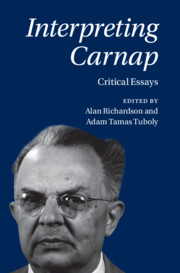Book contents
- Interpreting Carnap
- Interpreting Carnap
- Copyright page
- Contents
- Contributors
- Acknowledgments
- Abbreviations
- Introduction
- Part I Philosophy in New Dress
- Part II Naturalism and Method
- Part III The Logical and the Linguistic
- Chapter 8 Carnap’s Approach to Semantics and Syntax
- Chapter 9 Carnap on the Formality of Logic and Mathematics
- Chapter 10 Carnap on Probability and Induction
- Chapter 11 Metaphysics, Tolerance, and Language Planning
- Part IV Science and Theories
- Bibliography
- Index
Chapter 11 - Metaphysics, Tolerance, and Language Planning
Carnap on International Auxiliary Languages
from Part III - The Logical and the Linguistic
Published online by Cambridge University Press: 01 February 2024
- Interpreting Carnap
- Interpreting Carnap
- Copyright page
- Contents
- Contributors
- Acknowledgments
- Abbreviations
- Introduction
- Part I Philosophy in New Dress
- Part II Naturalism and Method
- Part III The Logical and the Linguistic
- Chapter 8 Carnap’s Approach to Semantics and Syntax
- Chapter 9 Carnap on the Formality of Logic and Mathematics
- Chapter 10 Carnap on Probability and Induction
- Chapter 11 Metaphysics, Tolerance, and Language Planning
- Part IV Science and Theories
- Bibliography
- Index
Summary
This chapter discusses how Carnap’s philosophy of language affects his position on language planning issues. Carnap was an Esperantist from an early age, and he kept his interest for international auxiliary languages active throughout his life. In his Intellectual Autobiography, he clearly mentions the relation between his activity of building symbol systems as a logician and his interest for language planning for international communication. His controversy with Wittgenstein regarding Esperanto illustrates two opposing views of language, one as a functional device for various purposes and one as a carrier of tradition and identity. Carnap’s dismissal of the latter is rooted both in his principle of tolerance (and its underlying instrumentalism) and in logical empiricism’s attack on metaphysical concepts such as Volksgeist, shared by other language planners who emphasized the instrumental purpose of language and supported locutors’ active intervention in it either by language reform or by language construction. We argue that the antimetaphysical rejection of the romanticist view of language, sustained by Vienna Circle, led to a more liberal and flexible attitude toward language planning issues. Finally, the internationalism of logical empiricists was effective in shaping their favourable disposition towards international auxiliary languages.
Keywords
- Type
- Chapter
- Information
- Interpreting CarnapCritical Essays, pp. 214 - 234Publisher: Cambridge University PressPrint publication year: 2024



